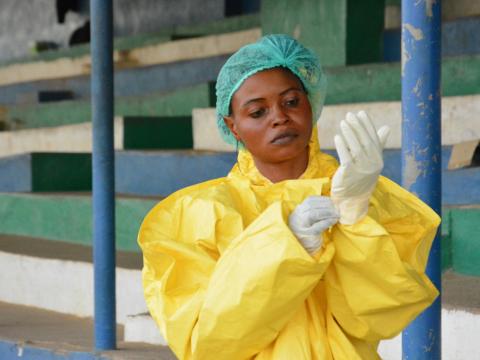Helping restore women’s dignity

38-year-old Elizabeth is a burial worker living in the Bo District of southern Sierra Leone. She strongly believes in the work she does - despite the stigmatization that goes with it - as it means she can help restore the dignity of women who lose their lives to Ebola.
Thanks to community education and awareness, many Sierra Leoneans are now aware that Ebola is most active on dead bodies. That means, because of the nature of their work, many burial workers have been shunned. Some have even had their tenancies terminated by their landlords.
Because of the nature of their work, many burial workers have been shunned. Some have even had their tenancies terminated by their landlords.
Despite this, Elizabeth, whose Aunty died from the disease earlier in the year, has strong reasons for joining the burial team.
She says:
“There was a need for women to join the burial team to restore the dignity of my fellow women. I think it is not proper for men to attend to or prepare the body of women who have died of Ebola for burial.
“In my burial team, if a female is involved, I always go in first in my full Personal Protective Equipment [PPE] and prepare the body in a respectable manner before the men come in.”
More information about World Vision's work with the burial teams.
Elizabeth joined the burial team in October 2014 when she heard that World Vision and its partners [The Red Cross, Christian Relief Agency, CRS and CAFOD] were recruiting workers to help carry out safe and dignified burials during the Ebola response.
Elizabeth was the first woman recruited in the burial team in her district.
When she started her job, Elizabeth knew it would mean a very different Christmas from the usual holiday.Speaking in December she said:
"There was a need for women to join the burial team to restore the dignity of my fellow women."
“There is no holiday for me this Christmas. This Christmas we will meet to work. A lot of people die of Ebola on a daily basis and burial workers are called upon to bury the dead on time, to avoid the spread of the virus. The longer the dead stay, the greater the risk of infection. Nobody knows what will happen on Christmas day.”
Elizabeth has a 16-year-old daughter who lives with her uncle in the Sierra Leone capital, Freetown, where she usually attends school. But with schools closed because of Ebola, Elizabeth has another motivation to fight the disease:
“We must all sacrifice to fight Ebola in order for things to be normal again. My daughter is out of school and I am not happy about that. I am scared. I call my daughter every now and then to educate her about Ebola so she can take it seriously,” she said.
To support the work against Ebola click here.